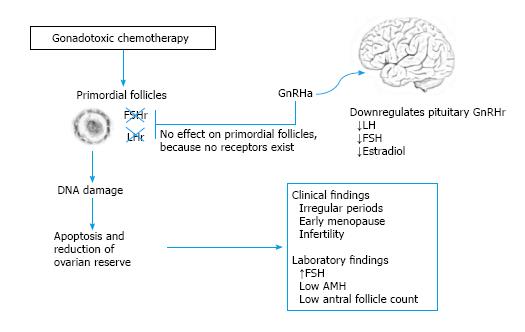Copyright
©The Author(s) 2017.
World J Clin Oncol. Jun 10, 2017; 8(3): 241-248
Published online Jun 10, 2017. doi: 10.5306/wjco.v8.i3.241
Published online Jun 10, 2017. doi: 10.5306/wjco.v8.i3.241
Figure 1 Impact of gonadotoxic chemotherapy and gonadotropin-releasing hormone analog on ovarian reserve and function.
Gonadotoxic chemotherapy reduces ovarian reserve, which is made up of resting and hormone-insensitive primordial follicles, by induction of DNA damage and apoptotic death. GnRHa reduces pituitary GnRH production and, as a result, blocks the release of FSH and LH from the pituitary, which in turn results in the cessation of late-stage follicle development. Because primordial follicles do not have FSH, LH, or GnRH receptors, GnRHa cannot have a direct influence on ovarian reserve. AMH: Anti-Müllerian hormone; FSH: Follicle-stimulating hormone; FSHr: FSH receptor; LH: Luteinizing hormone; LHr: LH receptor; GnRH: Gonadotropin-releasing hormone; GnRHr: GnRH receptor. Oktay et al. J Clin Oncol 2016; 34: 2563-2565, used with permission.
- Citation: Taylan E, Oktay KH. Current state and controversies in fertility preservation in women with breast cancer. World J Clin Oncol 2017; 8(3): 241-248
- URL: https://www.wjgnet.com/2218-4333/full/v8/i3/241.htm
- DOI: https://dx.doi.org/10.5306/wjco.v8.i3.241









